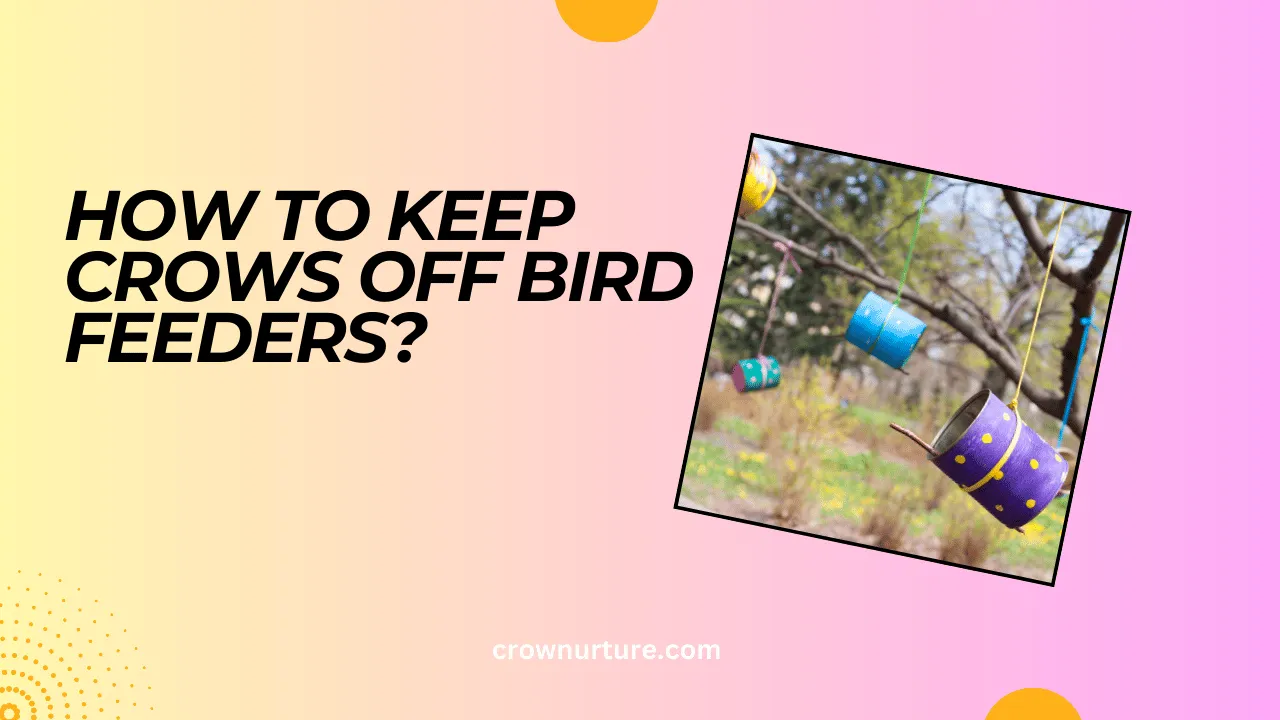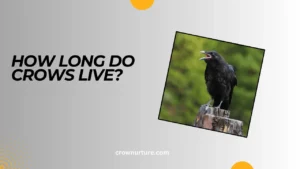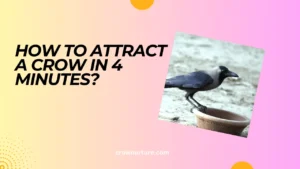You fill your bird feeder, eagerly anticipating the sight of colorful finches, cheerful chickadees, and fluttering sparrows. But instead of these small songbirds, a noisy gang of crows swoops in, scattering the smaller birds and gobbling up all the food.
For many bird enthusiasts, this scenario is all too familiar. Crows, while intelligent and fascinating, can be a challenge when it comes to backyard bird feeding.
Their territorial behavior, large size, and adaptability often make it difficult for smaller birds to enjoy the feeder. Left unchecked, crows can dominate the scene, leaving little to no food for the intended visitors.
But don’t worry—there are effective and humane ways to deter crows while still creating a safe haven for smaller birds. In this guide, we’ll explore strategies ranging from choosing the right feeders to employing deterrents and making your yard less inviting to crows. Let’s help you restore balance to your bird-feeding sanctuary.
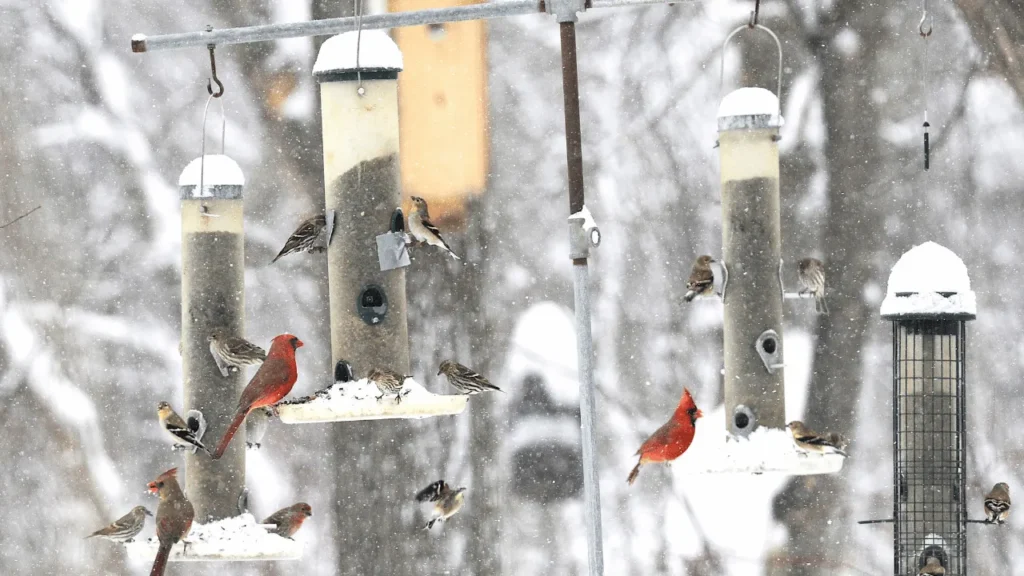
Contents
Understanding Crow Behavior
Crows are renowned for their intelligence and problem-solving abilities. They can quickly figure out how to access food and adapt to changes in their environment. This makes them particularly persistent when targeting bird feeders.
These birds are also highly territorial, often defending their food sources aggressively. Once they claim a feeder as their territory, they may prevent smaller birds from approaching, creating an imbalance in your bird-friendly space.
Crows have an omnivorous diet, eating seeds, nuts, insects, and even scraps of human food. Unfortunately, this overlaps significantly with the food provided in most bird feeders, making them a common visitor.
Choosing Appropriate Feeders
Investing in the right feeder is one of the most effective ways to keep crows away while allowing smaller birds to feed. Weight-sensitive feeders are designed to close when a heavier bird, like a crow, lands on them. This ensures that only lighter birds can access the food.
Another excellent option is cage feeders, which are surrounded by a mesh that keeps larger birds out while allowing smaller species to enter. These feeders are particularly effective in creating a crow-proof setup.
Tube feeders with small perches and narrow openings are another solution. Crows, with their larger size and beaks, find it challenging to use these feeders, making them an excellent choice for crow deterrence.
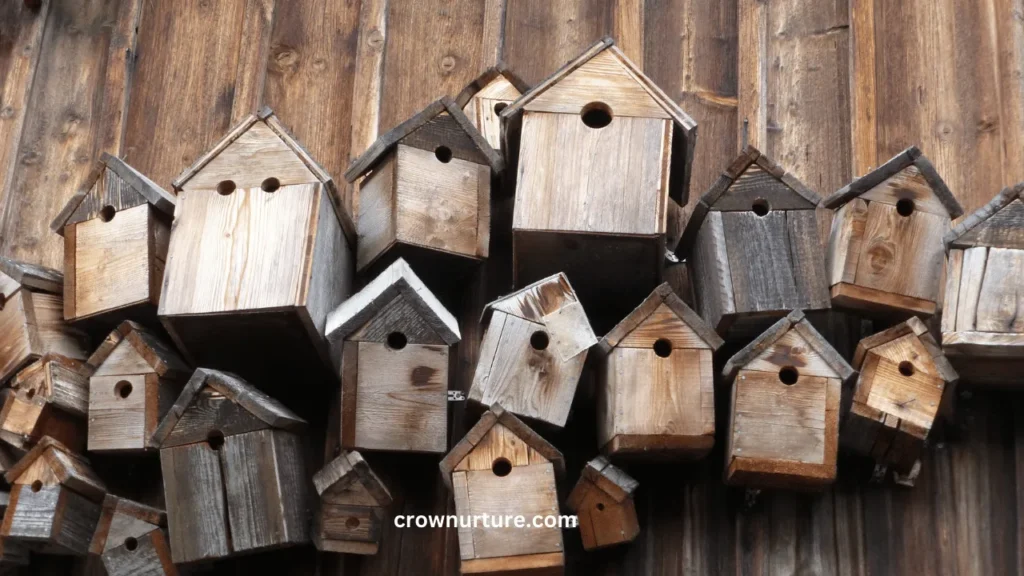
Utilizing Deterrents
Deterrents can effectively discourage crows from visiting your feeders. Visual deterrents like reflective objects (e.g., CDs or aluminum foil) and predatory decoys (such as fake owls) can scare off crows temporarily. However, crows are smart and may adapt to these over time.
Auditory deterrents, like recorded bird distress calls, can be used to create an environment that crows perceive as unsafe. While effective initially, they may lose their impact with prolonged use.
For a more direct approach, consider taste deterrents. Some bird seed products are coated with natural repellents that birds dislike. These treatments are safe for wildlife but discourage crows from feeding.
Creating a Less Attractive Environment
Reducing the appeal of your yard can help minimize crow visits. Start by removing attractants such as fallen seeds, accessible garbage, or compost piles. These food sources can draw crows even if your feeders are protected.
Limiting water sources, such as birdbaths or fountains, can also deter crows. While essential for other birds, crows may be less likely to linger if water is not readily available.
Finally, consider habitat modifications. Trimming trees and removing overhanging branches near feeders can make it harder for crows to perch and claim the area as their territory.
Important Considerations
When deterring crows, prioritize bird safety by using humane methods that do not harm them or other wildlife. Avoid aggressive tactics that might disrupt the ecosystem in your backyard.
It’s also important to consider the environmental impact of your methods. For example, avoid using repellents that could harm plants or other animals in your garden.
Lastly, reflect on the ethical considerations of bird feeding. While it’s natural to want to protect smaller birds, crows play an essential role in the ecosystem. Strive for a balance that respects all wildlife.
Conclusion
Crows may be fascinating creatures, but their dominance at bird feeders can be frustrating for bird enthusiasts. Fortunately, by choosing appropriate feeders, employing deterrents, and making your yard less inviting, you can strike a balance that benefits all birds.
Effective bird feeding is about creating harmony in your backyard. While smaller birds need protection, it’s also essential to respect the role of crows and other wildlife in the ecosystem. By using humane methods, you can enjoy a thriving, diverse bird population without resorting to harsh measures.
So next time you see a crow hovering near your feeder, remember: with the right strategies, you can coexist peacefully while still creating a haven for songbirds.
FAQs
1. Why do crows dominate bird feeders?
Crows are larger, more aggressive, and highly intelligent, making them adept at monopolizing food sources like bird feeders.
2. What type of feeder works best to deter crows?
Weight-sensitive feeders, cage feeders, and tube feeders are highly effective in preventing crows from accessing bird food.
3. Do shiny objects really deter crows?
Yes, reflective objects like CDs or foil can deter crows temporarily, as the sudden flashes of light make them uncomfortable.
4. Are there humane ways to keep crows away?
Yes, using bird-safe deterrents, modifying habitats, and choosing the right feeders are all humane methods to discourage crows.
5. Will crows eventually adapt to deterrents?
Crows are intelligent and may adapt over time to static deterrents like decoys or reflective objects. Rotating methods can improve effectiveness.
6. Can I completely stop crows from coming to my yard?
While it’s unlikely to eliminate crows entirely, you can significantly reduce their presence by removing attractants and using targeted deterrents.

